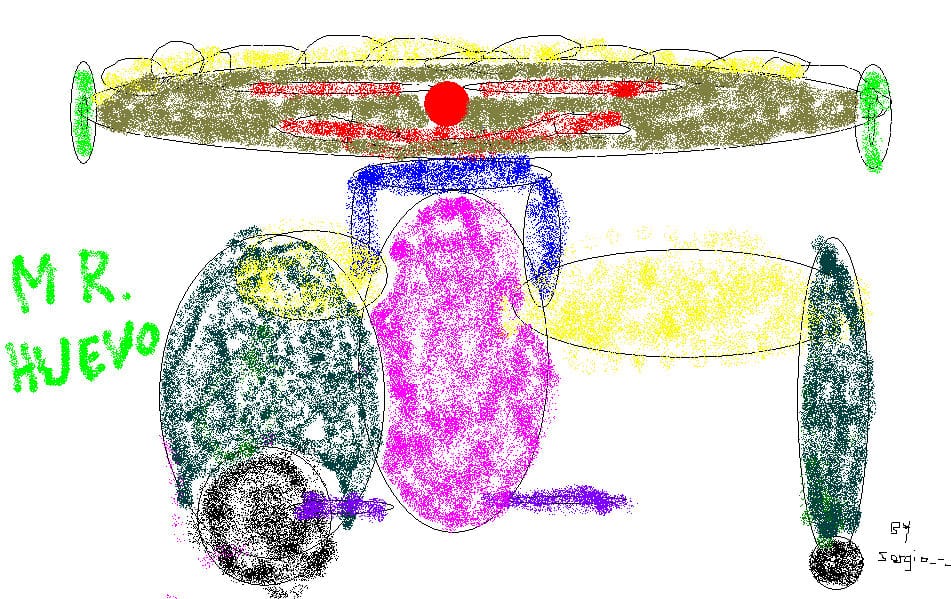Pixels, Packets & Puberty: Fun Adventures of an Accidental 90's Kid-Hacker

I’ve always been as attracted to computers as iron is to a magnet.
The love affair started when I was four in 1997 and barely tall enough to see the keyboard. My dad would power-up our first PC—pure beige glory with a golf-ball shaped power-on button running MS-DOS—and I’d beg him to launch my favorite racing game. I don’t even remember the title anymore, only that I religiously picked the slowest car on the grid because I hadn’t yet unlocked the black-belt skill of… well… shifting gears.
I’d putter along happily while my 14-year-older brother lapped me. It took a few summers and the release of Colin McRae Rally before the tables finally turned and I started beating him. To this day I swear I can still smell warmed plastic and hear the high-pitched whine of that CRT whenever I load a modern racing sim.
Cossacks, splintered bed frames, and other minor crimes
By 2001 I had discovered strategy games. Cossacks was my crack, and my poor older brother was the unfortunate gatekeeper of the family PC. Every time he tried to study I’d sneak in and “politely” suggest to play Cossacks so I could see him marshal the troops. One morning I actually jumped onto his bed to wake him up to play Cossacks, the wooden slats snapped, and the entire mattress caved in. He still tells that story at family dinners.
The upside of this sibling warfare is that one of his friends—a visiting messiah armed with Windows 98 boot disks—would regularly come over to “fix” the computer I had inevitably borked. I watched, learned commands, and filed them away for later mischief. Looking over his shoulder steered me onto the road to IT.
Around that same time my brother and I launched what might have been the world’s least-attended protest: we wanted USB—badly. Our PC’s motherboard had none, so every time we borrowed a friend’s flash stick or tried to off-load photos from the family camera we had to admit defeat. After weeks of pleading, Dad came home with a gleaming PCI USB expansion card. The box hadn’t even hit the kitchen table before we were chanting “U-S-B! U-S-B!” like crazed fans at a cup final. Installation took ten minutes; bragging about it took months.
Cyber-cafés, mIRC and sergio_-_
Those years included some hazy afternoons in smoke-scented cyber-cafés, rows of CRTs humming like microwaves, although I connected to Internet mostly at home. At seven or eight I installed mIRC and adopted the cringe-worthy nickname sergio_-_. I’d hang out in channels like #la_tierra_inhabitada and #cartagena, trying to sound older than my pixelated nick.
My brother’s friends loved teasing a friend called Brian, sometimes so relentlessly that trivia quizzes popped up: “Who’s smarter—Brian or Rubén’s nine-year-old brother?” Spoiler: they rigged the vote in my favor. My real win was memorizing mIRC commands faster than my multiplication tables.
From Hattrick to Habbo Hotel: the social awakening
Browser games such as OGame, Travian and Hattrick stole countless afternoons, but nothing hit like Habbo Hotel when I was eleven. A shared isometric world, thousands of avatars, furniture you could trade—this was the metaverse before anyone used the word. I even had my first virtual girlfriend there. Shout-out to cris-00, who may or may not have been a 40-year-old man behind the screen. Internet Rule #1: assume nothing.
Habbo also handed me my first taste of Internet injustice. A notorious con artist named zapata. (yes, the period was part of the nickname) swindled me not once but twice. A year later karma let me team up with kirara, another player devoted to vigilante justice. We began stalking scam rooms, collecting screenshots, and forwarding evidence to the mods until zapata. finally tasted the ban hammer. I promise the victory dance was glorious. We gained our reputation as anti-scammers. We were quite respected by the mods during these years.
The hacker seed is germinated (2005)
By twelve I was living on elhacker.net, grinding through its old-school challenges. I begged my mom for a McGraw-Hill called “Hackers 4: Secrets & Solutions for Network Security.” It cost a kidney and half a liver, but I devoured it.
Yes, the exploits were dated—nobody was running that version of Sendmail anymore—but the methodology felt like sorcery. Soon after, I tore through Kevin Mitnick’s "The Art of Deception" and "The Art of Intrusion". Less hands-on than I’d hoped, more social-engineering theater, but every page crackled with possibility.
Detective work in high school
2005 was also my debut in a bilingual program. Think half the curriculum in English, half in Spanish, plus an online forum shared with a partner school in Portsmouth, UK. One morning the teachers woke up to a wall of anonymous insults and F-bombs. Naturally, the question came: “Sergio, can you find the culprit?” Sadly they wouldn’t give me server logs—budget CSI ends fast without evidence—but that day cemented my reputation as the school’s resident cyber-sheriff.
Because IT trusted me, I pitched a genius idea: “Let’s limit Windows Update bandwidth so our browsing is faster!” Translation: I went around editing the registry on every classroom computer in all classrooms, convinced it boosted the Internet. It probably did nothing except teach me how to spell HKEY_LOCAL_MACHINE.
Ophcrack & the day I stole everyone’s password
Years later in the same high-school, armed with an Ophcrack live CD, I started booting lab PCs and recovering the Windows passwords “for educational purposes.” The only one I cracked turned out to be embarrassingly simple. I remember thinking: We deserve everything that’s coming to us.
The Hotmail Twilight Zone and impatience (2007)
At fourteen, I embarked on a doomed quest to resurrect an old Hotmail account I’d created purely for meme warfare: joseja or joseja1—honestly, memory’s foggy. After hundreds of password-reset attempts, I somehow slipped in with a random guess.
And there it was: an inbox full of completely alien emails, including scans of a National ID (DNI) of a well-known Villarreal CF player. Yet mixed among them were messages from my own address. To this day I don’t know whether I hijacked someone else’s hacked account or stumbled into a parallel universe. A friend talked me down from poking around further, and I never logged in again. Schrödinger’s Inbox remains sealed.
Hardware wasn’t safe from my impatience either. One afternoon the PC refused to POST, so I yanked off the side panel and started jiggling the graphics card like a TV antenna from the ‘80s—pure stress therapy. The machine stayed dead, but the next day it returned from the repair shop with a fresh service bill and a replacement GPU… that benched lower than the one I’d lovingly assaulted. Lesson learned: percussive maintenance plus teenage rage equals downgrade.
Keyloggers in MSN Messenger land
The same year I experimented with keyloggers and trojans. I encrypted one, mailed it to a buddy over MSN, then realized neither of us knew how to decrypt it on his side. Such a failed attempt to deploy a trojan.
Another time I actually did grab a friend’s password—pure faculty of curiosity—and later got caught. Miraculously we’re still best friends, living proof that disclosure beats betrayal.
Twelve-hour Metin2 marathons
2008 arrived with a dragon-shaped hole in my schedule called Metin2. One summer I clocked twelve-plus-hour days, taking real-world breaks only when my character needed one. The grind was real, the dopamine drip relentless. Thankfully that phase ended before I needed carpal-tunnel surgery—or an intervention.
Retrospective: why I didn’t become a full-time security guru
Given all that, it’s no shock I landed in tech. Strangely, I never dove fully into professional security. Part of me saw the burnout parade marching ahead and swerved. Still, every time I rewatch Jason Bourne or scan a Wi-Fi network, the old spark returns. Those childhood escapades weren’t just play; they were a playground-level introduction to logic, systems thinking, and the ethics of poking holes in things.
Lessons I carry forward:
• Curiosity ages well; sleep deprivation does not.
• Breaking stuff is easy; fixing it earns respect.
• The line between prank and crime is thinner than dial-up bandwidth.
• Never trust anyone called zapata. with a trailing dot.
• Always know which bed slats can support a small human on a similar-to-caffeine high.
Closing bytes
From slow DOS racers to IRC flame wars, from Habbo heartbreaks to Hotmail black holes, my childhood played out in pixels and packets. I wouldn’t trade those nights of glowing monitors and clacking keyboards for anything—except maybe stronger parental-control software so my brother could have kept his bed.
If you made it this far, thanks for riding shotgun through my formative cyber-years. Bring on the next rabbit hole of curiosity—ideally with no bed frames sacrificed.
